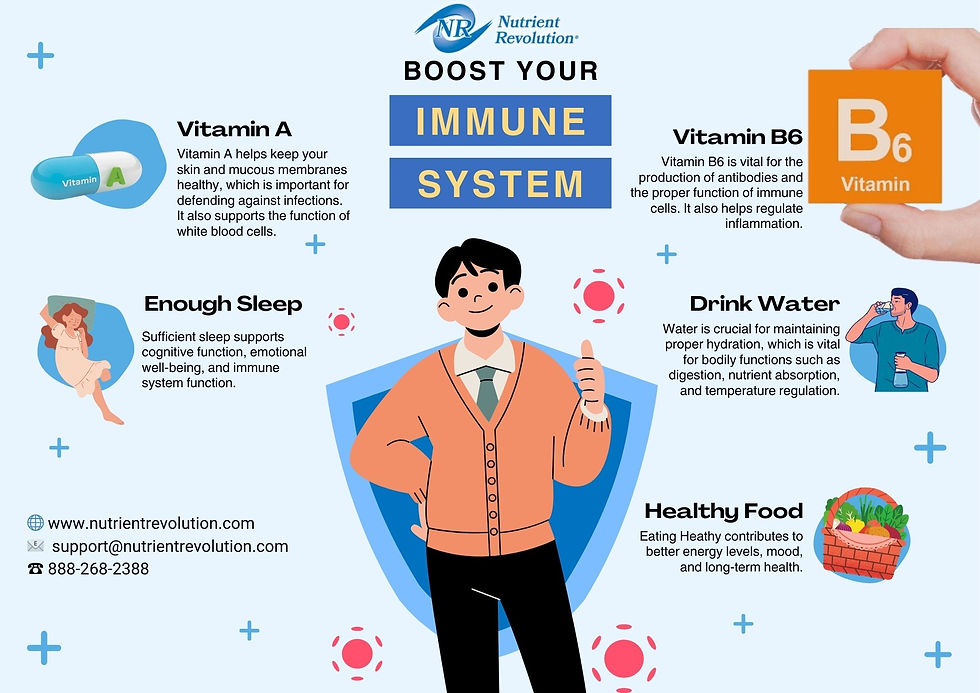What Supplements Are Good for Your Immune System?
- Nutrient Revolution LLC

- Aug 1, 2024
- 3 min read

In our fast-changing world, keeping a strong immune system is more important than ever. Supplements can give your immune system a helpful boost and keep you feeling your best. In this blog, we will talk about the best supplements for your immune health, including Nutrient Revolution®'s "Core Immunity" with its "Core Immunity Health Vitamins."
Let’s look at some top supplements that can boost your immune health.
1. Vitamin A
Benefits: Vitamin A helps keep your skin and mucous membranes healthy, which is important for defending against infections. It also supports the function of white blood cells.
Sources: Carrots, sweet potatoes, spinach, and supplements.
2. Vitamin B6
Benefits: Vitamin B6 is vital for the production of antibodies and the proper function of immune cells. It also helps regulate inflammation.
Sources: Poultry, fish, bananas, and supplements.
3. Vitamin B12
Benefits: Vitamin B12 supports the production of red blood cells and helps maintain healthy nerve cells. It also plays a role in producing DNA and supporting overall immune function.
Sources: Meat, dairy products, fortified cereals, and supplements.
4. Vitamin C
Benefits: Vitamin C is a powerful antioxidant that protects cells and helps produce white blood cells. It also improves the function of immune cells and enhances the body’s ability to absorb iron from plant-based foods.
Sources: Enjoy a variety of citrus fruits, indulge in juicy strawberries, add colorful bell peppers to your meals, and consider supplements for an extra boost.
5. Vitamin D
Benefits: Vitamin D helps regulate the immune system and enhances the pathogen-fighting effects of white blood cells. It is crucial for immune health, especially during the winter months when sunlight exposure is limited.
Sources: Sunlight, fatty fish, fortified foods, and supplements.
6. Vitamin E
Benefits: Vitamin E is an antioxidant that helps protect cells from damage and supports the immune system. It also helps in the formation of red blood cells.
Sources: Nuts, seeds, spinach, and supplements.
7. Vitamin K
Benefits: Vitamin K is important for blood clotting and bone health. It also plays a role in regulating immune responses and reducing inflammation.
Sources: Leafy greens, broccoli, and supplements.
8. Folate (Vitamin B9)
Benefits: Folate is essential for cell division and the production of DNA. It supports the production of white blood cells and overall immune function.
Sources: Leafy greens, legumes, and fortified cereals.
9. Copper
Benefits: Copper helps produce red blood cells and supports the function of the immune system. It also has antioxidant properties that protect cells from damage.
Sources: Shellfish, nuts, seeds, and supplements.
10. Iodine
Benefits: Iodine is crucial for the production of thyroid hormones, which help regulate metabolism and support immune function.
Sources: Iodized salt, seaweed, and supplements.
11. Iron
Benefits: Iron is essential for the production of hemoglobin, which carries oxygen in the blood. It supports immune cell function and helps fight infections.
Sources: Red meat, beans, lentils, and supplements.
12. Magnesium
Benefits: Magnesium supports over 300 biochemical reactions in the body, including those involved in immune function. It also helps regulate inflammation.
Sources: Nuts, seeds, whole grains, and supplements.
13. Selenium
Benefits: Selenium is an antioxidant that protects cells from damage and supports the immune system. It also plays a role in regulating inflammation.
Sources: Brazil nuts, seafood, and supplements.
14. Zinc
Benefits: Zinc is crucial for the development and function of immune cells. It also helps reduce the duration of colds and supports overall immune health.
Sources: Meat, shellfish, legumes, seeds, nuts, and supplements.
Conclusion
Maintaining a strong immune system is essential for overall health. Key vitamins and minerals like Vitamins A, B6, B12, C, D, E, K, folate, copper, iodine, iron, magnesium, selenium, and zinc all play important roles in supporting immune function. Incorporating these nutrients into your diet through foods or supplements can help keep your immune system in top shape. Remember to consult with a healthcare provider before starting any new supplement routine.






Comments